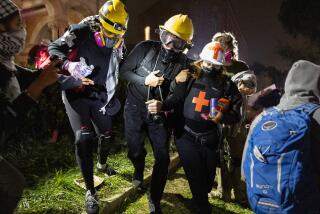EDUCATION : Innovative Program Helps Teen Mothers Finish High School
A pregnant high school student is an all-but-certain dropout prospect. Teachers, counselors and administrators know it’s very likely that once the baby is born, the young mother will be gone for good.
An innovative program in the Santa Monica-Malibu Unified School District is aimed at breaking this pattern.
The School-Aged Parenting and Infant Development (SAPID) program, which entered its third year last month, tries to keep teen-age mothers in school by providing day care, meals and diapers for their children. Of the 28 young women who have participated in the program in its first two years, all but three have stayed in school.
What distinguishes it from most other programs designed for teen-age mothers, including several in the Los Angeles Unified School District, is that the mothers are not isolated in a school of their own. Instead, the emphasis is on allowing the mothers to function in a normal school environment as much as possible.
The program took a step toward the mainstream at the beginning of the new school year when it moved to Santa Monica High School. For its first two years, the program operated out of Olympic High, which had been the Santa Monica-Malibu District’s continuation school for students considered dropout risks. In part because of budget cuts and declining enrollment, Olympic merged this year with Santa Monica High.
Program director Mary Wehbi believes the change is all for the good. At Santa Monica High, the mothers are “just a regular part of the student body,” she said, and the larger campus offers them “a wider range of classes, social activities (and) academic challenges.”
“They still are teen-agers and enjoy these things a lot,” Wehbi said. “It bothers them that they’re left out.”
While the teen-age mothers are in class, toddlers work at music, painting and language skills; infants are held, rocked and read to.
The program also provides at no charge the services of a part-time nurse and a social worker. But the teen-agers aren’t exactly off the hook. They must complete the regular high school graduation requirements, attend special parenting and child-care courses, and demonstrate competence in a variety of infant- and child-care tasks.
“Not only are they finishing high school,” Wehbi said, “they’re also given parenting skills.”
Jennifer Malis, 18, appreciated learning gentle methods of disciplining her daughter Shanyssa, 2. “I learned how to deal with her when she’s cranky,” the recent graduate of the program said. “You don’t scream or hit, but you may raise your voice a little.”
The classes helped Dana Holsome, 15, learn how to deal with the basic needs of her infant son, Rayvelle. “SAPID taught me how to feed him and when, how to change diapers and put him to sleep, and to find out what’s wrong when he’s crying before I get all up-tight.”
The children’s fathers are also encouraged to join the program. In fact, it receives special state funding to help the young men get child-care training and a high school diploma.
So far, fathers are showing interest and thwarting the “fleeing father” stereotype. “In our first two years, quite a few of them were involved,” Wehbi said. Most fathers who were students at Santa Monica High “participated just as the mothers did.” Those who did not attend the school often came in for special occasions and visits.
Program officials also invite students who are not pregnant or parenting to take the child-care classes and volunteer in the nursery so they can learn firsthand about the hard work and occasional anguish that come with having a child.
“The state Department of Education feels that if students have a realistic picture of what it’s like to have a baby at that age, that it may be a great deterrent,” Wehbi said.
Other school districts are showing an interest in the Santa Monica experiment. The Culver City Unified School District launched a program modeled after SAPID this fall. Wehbi has also received inquiries about the program from administrators at Hamilton and Venice high schools in Los Angeles.
The program is funded with $82,000 from the state and $6,000 in community donations. Salaries take the largest share because state guidelines for children under age 2 require one supervising adult employee for every three children.
Until this year, teen mothers have had to leave the program upon high school graduation or at age 18, but a new partnership with nearby Santa Monica College now allows the women to continue using SAPID day care while attending college.
Malis is one of the first teen-age mothers to participate in this new arrangement. She is keeping her daughter in the day-care program while taking administration of justice classes at SMC.
College is a reality for Malis only because of guidance from the program, she said. “I didn’t ever go to school and I got bad grades. But when I went to SAPID, I went to school every day, I got straight A’s and two scholarships.”
If the program is to succeed and reach as many students as possible, Wehbi says it is essential to avoid a judgmental attitude toward teen-age--and usually unmarried--mothers. “I don’t want to get into the moral issues that a lot of people feel are there,” she said. “My feeling was, the babies are here, so give them the best start possible.” Some think that the mothers are also getting the best start possible--with the rest of their lives. Said Malis: “Without Mary Wehbi, I wouldn’t have anything, a diploma or a future.”
Holsome agrees. “If it wasn’t for SAPID, I think I would be home just sitting around, not doing anything. But now I have a chance to get an education. I’m very happy with that.”
More to Read
Start your day right
Sign up for Essential California for news, features and recommendations from the L.A. Times and beyond in your inbox six days a week.
You may occasionally receive promotional content from the Los Angeles Times.






